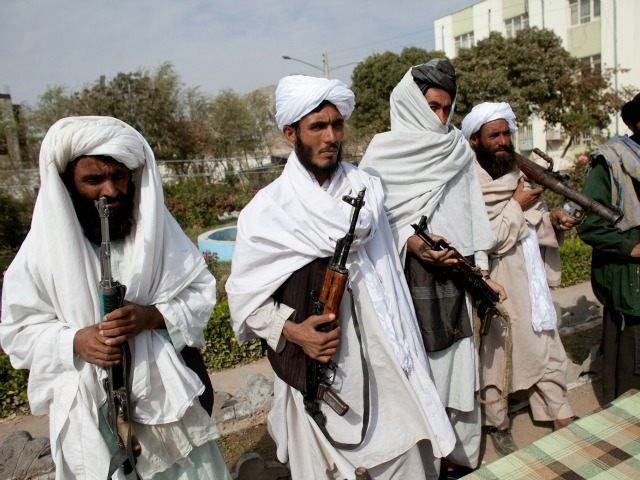A senior Russian diplomat reportedly said Moscow is ready “to show flexibility” on possibly easing United Nations Security Council sanctions imposed on Afghanistan’s Taliban, which has intensified attacks against U.S. service members and American-trained Afghan security forces.
The Taliban recently claimed responsibility for killing six U.S. troops, and the group has been behind a record number of casualties incurred by the Afghan National Defense and Security Forces (ANDSF), which includes army, police, and militia units.
“He appeared to be suggesting that major powers should consider an accommodation with the Taliban to stop the spread of rival Islamic State [ISIS/ISIL] militants, deemed a much bigger, international menace by the West,” Reuters reports, referring to Zamir Kabulov, a department chief at Russia’s Foreign Ministry and President Vladimir Putin’s special envoy on Afghanistan.
“We are ready to approach in a flexible way the issues of a possible easing of the regime of sanctions under Security Council Resolution 1988 on the Taliban, if this does not contradict Afghanistan’s national interests,” the Tass news agency quoted Kabulov as saying, according to Reuters.
“No one is talking today about achieving a victory by military means over the Taliban, while the implementation of the national reconciliation policy would in practice mean their return to power,” he added.
Kabulov noted that Russia supports the U.S.-backed Afghanistan government police aimed at achieving national reconciliation.
In 2011, the UN Security Council Resolution 1988 was passed, designating the Taliban insurgency as a threat to international peace and imposing a freezing of assets, bans on travel, and other restrictions on individuals deemed to be associated with the terrorist group.
Although the Taliban branch in Pakistan—Tehrik-e Taliban Pakistan (TTP)—is listed as a foreign terrorist organization by the United States, the Afghan Taliban is not. TTP is also known to carry out attacks on the Afghanistan side of the country’s border with Pakistan.
ISIS terrorists, which have seized swaths of Iraq and Syria, have established a presence in eastern Afghanistan and have been engaged in turf battles with the Taliban, which has labeled ISIS as “barbaric” in the Afghan territory it has captured.
Last week, Kabulov said that Russian interests in Afghanistan “objectively coincide” with those of the Taliban movement in the fight against ISIS.
He noted that Russia had established communication channels to exchange information on ISIS with the Taliban.
“Moscow, currently conducting a bombing campaign in Syria it says is aimed at Islamic State forces, has been concerned about the possible spread of Islamic State from Afghanistan into neighboring ex-Soviet states like Tajikistan, Uzbekistan and Turkmenistan,” points out Reuters.
U.S. Gen. John Campbell, the top commander of U.S. and NATO forces in Afghanistan, and the Pentagon have acknowledged that ISIS is growing in Afghanistan.
“Groups associated with Islamic State have made growing inroads in Afghanistan, attracting fighters and support away from disenchanted members of the Taliban,” reports Reuters.
“They have been battling government forces and the Taliban in a challenge for supremacy of the Islamist insurgency, and its rise has caused alarm outside Afghanistan, with U.S. commanders citing the movement as a reason to delay troop withdrawals,” it adds.
Militants from the ethnic Uzbek minority in Afghanistan have been linked to the Islamic State.
Russian is reportedly helping to strengthen the Afghan security forces.
In September, a United Nations report revealed that ISIS is actively recruiting supporters in nearly three-quarters (25) of the country’s 34 provinces.
Kabulov estimated in October that there were nearly 3,500 ISIS-linked jihadists in Afghanistan, adding that the number was growing.
Gen. Campbell recently said that between 1,000 to 3,000 ISIS-linked militants were operating in Afghanistan.

COMMENTS
Please let us know if you're having issues with commenting.